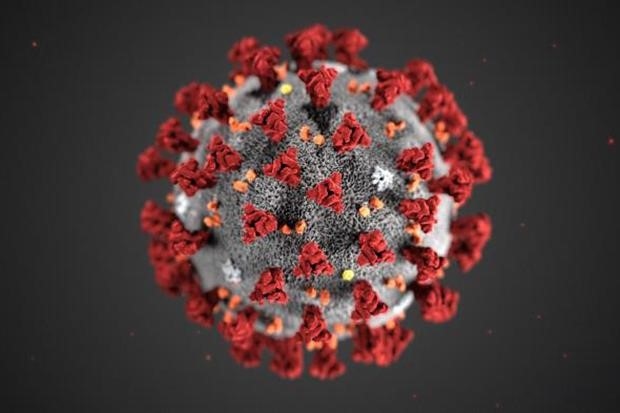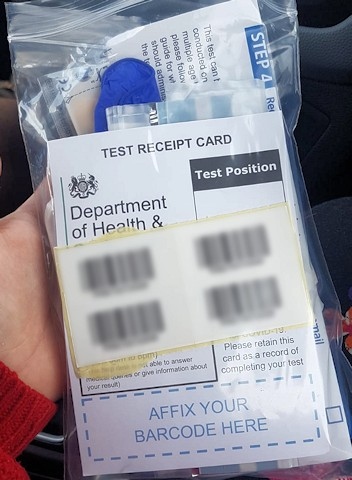Covid-19: what has changed
Date published: 09 September 2020

Illustration of COVID-19, created by the Centres for Disease Control and Prevention (CDC)
The government has announced new measures to suppress the virus and keep the number of infections down (Wednesday 9 September).
It is critical that everybody observes the following key behaviours:
- HANDS – Wash your hands regularly and for 20 seconds.
- FACE – Wear a face covering in indoor settings where social distancing may be difficult and where you will come into contact with people you do not normally meet.
- SPACE – Stay 2 metres apart from people you do not live with where possible, or 1 metre with extra precautions in place.
Local restrictions
The borough of Rochdale’s infection rate has risen to 65.9 per 100,000 people - the borough’s highest figure since 24 April, at the height of the pandemic.
Rochdale is already under local restrictions along with other Greater Manchester boroughs but the council is concerned that the measures are not working.
Local restrictions have priority over national restrictions.
Current local restrictions mean that everyone should:
- Not meet people from different households either indoors or in private gardens
- Keep two metres apart at all times
- Avoid physical contact with anyone outside your own household, including shaking hands or hugging
- Do not share a vehicle with anyone outside your household
- Only visit venues such as bars, pubs, restaurants and places of worship with your own household or support bubble
- Wear face coverings in shops and all public places, as much as possible
- Get tested even if you don’t have symptoms and isolate if you are told to do so
- Do not visit friends or family in care homes, other than in exceptional circumstances
Limited social groups
From Monday 14 September, you must not meet with people from other households socially in groups of more than six. This will apply indoors and outdoors, including in private homes.
There will be a limited number of exemptions. Covid-19 secure venues, such as places of worship, restaurants and hospitality venues, can still host larger numbers in total but groups of up to six must not mix or form larger groups.
This rule will not apply to individual households or support bubbles of more than 6 who will still be able to gather together. Education and work settings are unaffected, and organised team sports will still be able to proceed, as will weddings and funerals up to 30.
Businesses will have a clear duty to support NHS Test and Trace
From 18 September, it will be mandatory for certain businesses to have a system to collect NHS Test and Trace data, and keep this for 21 days. Core Covid-19 Secure requirements will be mandated for hospitality businesses, and egregious breaches enforced. The government has also published simplified Covid-19 Secure guidance, available here.
Supporting Local Authorities
The government will support Local Authorities and police forces to respond to breaches of Covid-19 Secure guidelines. A register of newly qualified and recently retired Environmental Health Officers (EHOs) will be registered so that Local Authorities can recruit more quickly and fill any gaps. In addition, the government will introduce Covid-19 Secure Marshals to help local authorities support social distancing in towns and city centres.
Border requirements
The government will take steps to improve compliance with border requirements. The Passenger Locator Form needed for travelling to the UK will be simplified and take measures to ensure passengers have filled out their form before departure. Border Force will step up and target their enforcement efforts at the border to ensure arrivals are complying with the rules.
Review of venue pilot
The government will review plans to pilot larger audiences in venues this month. Planned sports pilot events will be limited to smaller, safer numbers, with strict conditions to ensure social distancing, and will not take place in areas where incidence is high. The government’s intention to return audiences to stadia and conference centres will be reviewed from 1 October.
Restricted hours
The government will restrict the opening hours of premises, initially in local lockdown areas, with the option of national action in the future. This has been introduced in Bolton, following a steep rise in cases, and will seek to restrict activities that may lead to a spread in the virus.
Testing
Mr Johnson said the government wants to use testing to identify people who are negative, and is looking at new tests (such as swabs or saliva) which provide results in 20 minutes.
He added sports venues could test and let in those with a negative result, whilst people could be released from quarantine – if negative – when returning from abroad.
The government is working hard to increase testing capacity to 500,000 tests per day, Mr Johnson confirmed.
Schools
Prime Minister Boris Johnson said his priority is keeping schools and colleges open, and they should only be closed as a last resort. Professor Chris Whitty, Chief Medical Officer, said rates in schools are low.
He says the Department for Education is issuing new guidance today, which will urge universities not to send students home if they are sick, as this could spread the virus.

Further measures announced at the press conference include:
- Opposition to extending furlough
- New restrictions unlikely to be lifted within three weeks
- Importance of people outside local restriction areas not having tests when they are not needed: only booking a test if you have a fever, a new continuous cough, or you’ve lost your sense of taste or smell – if you don’t have those symptoms and haven’t been asked to book a test, please don’t.
Speaking on Wednesday, Mr Johnson said: “As your Prime Minister, I must do what is necessary to stop the spread of the virus and to save lives. We will of course keep the rule of 6 under constant review and only keep it in place as long as it’s necessary.
“I also want to see – and the public wants to see – stronger enforcement of the rules which are already in place. So I’ve have tasked the Cabinet with increasing enforcement and I would like to thank the police, as always, and other authorities for the work they are doing to keep us all safe.
“Let me be clear – these measures are not a second national lockdown – the whole point of them is to avoid a second national lockdown.
“By bearing down on social contact and improving enforcement, we can keep schools and businesses open, in the knowledge they are COVID Secure.
“I have always said schools and colleges should only ever be shut again as a very, very last resort. As the Chief Medical Officer and Chief Scientific Adviser have said, the long term risks to children’s life chances of not going to school are significant and far greater than the health risks of going back to school.
“Our plan – this 'moonshot' that I am describing – will require a giant, collaborative effort from government, business, public health professionals, scientists, logistics experts and many, many more. Work is underway – and we will get on at pace until we get there, round the clock.
“We are hopeful this approach will be widespread by the spring and, if everything comes together, it may be possible even for challenging sectors like theatres to have life much closer to normal before Christmas. But as I have said before, all this progress is contingent on continued scientific advances and though we’re hopeful, I cannot 100% guarantee that those advances will be made. That is why it is so important that we take these tough measures now.
“I believe we will continue to drive this virus down and that we will beat this virus before too long.
“So let’s work together and follow the rules: meet in groups of no more than six. Wash your hands, cover your face, and make space.”
Whilst confirmed cases in the UK have increased, this is most significant in younger people. Infection rates appear to be highest in those aged between 20-29-years-old; the test positivity rate is highest in those aged 17-19, followed by 20-29.
Government data says this is not just because more people are being tested as the percentage positive rate has also increased.
Do you have a story for us?
Let us know by emailing news@rochdaleonline.co.uk
All contact will be treated in confidence.
Most Viewed News Stories
- 1Drugs and cash seized during morning raids at suspected stash houses
- 2Ogden family announces intention to invest £2m in Rochdale AFC
- 3Middleton school hails another outstanding inspection result
- 4Man convicted after police car filmed driving dangerously in Kirkholt
- 5Former councillor and hospital campaigner Jean Ashworth has died
To contact the Rochdale Online news desk, email news@rochdaleonline.co.uk or visit our news submission page.
To get the latest news on your desktop or mobile, follow Rochdale Online on Twitter and Facebook.


